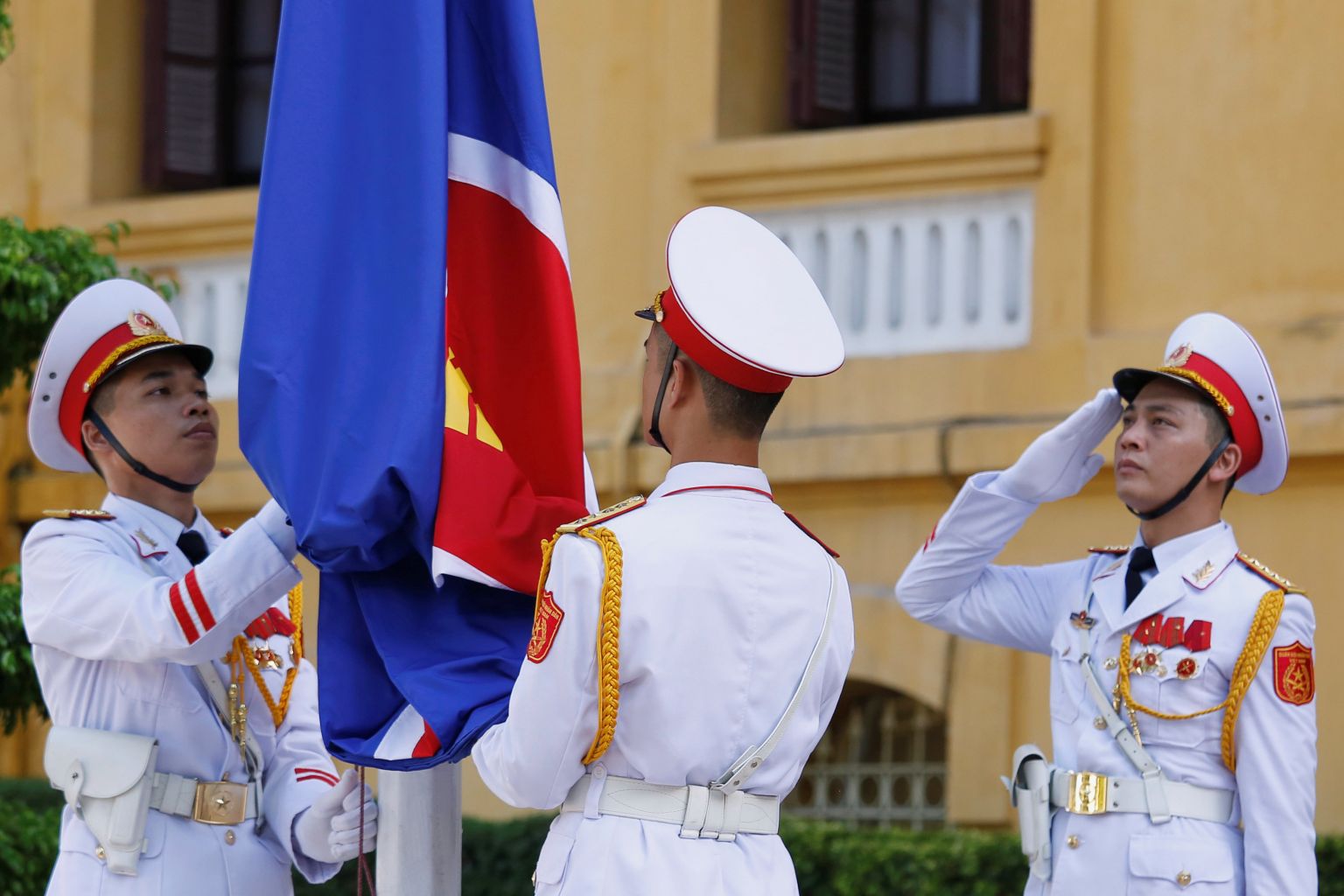Asean birthday is time for sombre reflection: The Nation
Sign up now: Get ST's newsletters delivered to your inbox

Honour guards raise an Association of Southeast Asian Nations (Asean) flag at a flag-raising ceremony to mark the 50th anniversary of the regional group at Vietnam's Ministry of Foreign Affairs.
PHOTO: REUTERS
Follow topic:
In its editorial on Aug 8, the paper says Southeast Asia is feeling squeezed between the increasingly isolationist US and ever-expansive China.
BANGKOK (THE NATION/ASIA NEWS NETWORK) - Today marks the 50th anniversary of the Association of Southeast Asian Nations (Asean), an inter-governmental organisation that brings together 10 countries in a joint struggle for survival in a changing world.
Half a century ago, the world was a place of bipolar politics. We had the liberal capitalism of the United States and Western Europe and the socialist communism of the Soviet Union and China. The Southeast Asian leaders at the time who feared the spread of communism - five to begin with - chose to group together for mutual protection.
Asean spent much of its first two decades fending off communist threats from Vietnam, Laos and Cambodia. The biggest front opened in Cambodia, when Hun Sen invited Vietnam to liberate his country from the Khmer Rouge, then four years into its horrendous campaign of genocide.
While Asean never dispatched troops to fight, it mobilised all of its diplomatic resources to support Cambodian dissidents. Having helped resolve the Cambodia civil war is the achievement of which Asean is most proud today.
The balance of world power tilted in the late 1980s when the Soviet Union collapsed, bringing an end to the Cold War and triggering sweeping reforms among the communist states of Southeast Asia. Vietnam's economy was liberalised and its troops withdrawn from Cambodia. It became a member of Asean in the mid-1990s.
The world has never since stopped changing. Asean's 10 members are now focused on economic progress and on building a community with institutions capable of dealing with the big world out there. It has successfully tapped into globalisation, liberalism and multilateralism. A majority of its members have experienced periods of fast economic growth as a result. More than half of the region's 628 million people now enjoy middle-class status and rising purchasing power. Former Asean chief Surin Pitsuwan has pegged current Gross Domestic Product at US$2.5 trillion (S$3.4 trillion.
The region has also benefited from the relocation here of global industries. It offers lucrative markets for imported consumer goods. Combined trade volume has reached US$2.6 trillion, while foreign direct investment has been hovering around US$140 billion a year, Surin says.
It appears, though, that the world is about to undergo another major change. The US and other leading countries are signalling disgruntlement at the current state of globalisation and liberal trade. There is grumbling from the West that China and to some extent Asean have gained too much at their expense. We've seen Britain break away from the European Union and the US under President Donald Trump turning more protectionist and unilateral.
At the same time, Chinese expansionism poses difficulties for Asean. While it is a major market for the member nations, nearly half of them are at loggerheads with Beijing over disputed territories in the South China Sea. Matters become more complicated when the US insists on having some say in Asian affairs.
Asean members bicker over how to handle the situation - deal with China individually or as a group? Platforms on which the bloc has traditionally relied to resolve rows - such as the Asean Regional Forum and East Asia Summit - could end up irrelevant.
The mood today, then, is not exactly conducive to celebration. Instead, sombre reflection is needed about the group's future amid rapid, unexpected changes.
No one has committed wrong in the past. We just need to see what's right for the future.
The Nation is a member of The Straits Times media partner Asia News Network, an alliance of 23 media entities.

